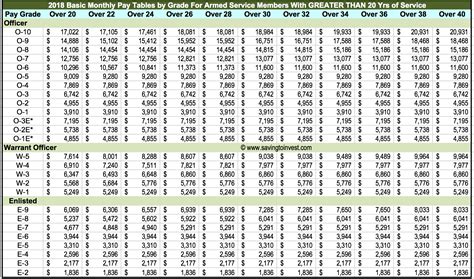U.s. Army Reserve Pay: Compensation & Benefits

The U.S. Army Reserve offers a wide range of compensation and benefits to its members. Whether you’re considering joining the Army Reserve or are already a member, it’s important to understand the financial rewards and incentives that come with serving in the Reserve. From monthly pay to healthcare coverage, here’s a comprehensive guide to U.S. Army Reserve pay and the benefits that accompany it.
1. Basic Pay
The basic pay for U.S. Army Reserve soldiers is determined by their rank and years of service. The Army Reserve uses the same pay scale as the active-duty Army, ensuring that Reserve soldiers are compensated fairly for their time and commitment.
1.1 Pay Grades
The U.S. Army Reserve has various pay grades, ranging from E-1 to E-9 for enlisted soldiers and O-1 to O-10 for officers. Each pay grade corresponds to a specific rank and has its own set pay range.
1.2 Pay Chart
There is an official U.S. Army Reserve pay chart that outlines the monthly pay for each rank and years of service. This chart is updated annually to reflect any changes in pay rates.
1.3 Drill Pay
Drill pay is the compensation Reserve soldiers receive for their monthly training and weekend drills. It is calculated based on the number of days served and the soldier’s pay grade.
2. Special Pay
In addition to basic pay, U.S. Army Reserve soldiers may be eligible for special pay based on their job, skills, or qualifications. Some examples of special pay include:
2.1 Hazardous Duty Pay
Soldiers who perform hazardous duties, such as handling explosives or working in dangerous environments, may receive additional compensation for the increased risks they face.
2.2 Language Skills Pay
Reserve soldiers who possess foreign language skills that are critical to the Army’s mission may be eligible for language skills pay. This pay recognizes the value of these specialized skills.
2.3 Combat Pay
When deployed to a combat zone or an area where they face imminent danger, Reserve soldiers may be eligible for combat pay. This additional compensation acknowledges the hardships and risks associated with combat operations.
3. Healthcare Benefits
The U.S. Army Reserve provides healthcare benefits to its soldiers to ensure they have access to quality medical care. Here are some key healthcare benefits available to Reserve soldiers:
3.1 Tricare Reserve Select
Tricare Reserve Select is a premium-based healthcare plan that offers comprehensive coverage to Reserve soldiers and their families. It provides access to a network of healthcare providers and covers a wide range of medical services.
3.2 Dental and Vision Coverage
Reserve soldiers can enroll in dental and vision insurance plans to ensure they receive regular dental check-ups and eye exams. These plans help cover the costs of preventive care and necessary treatments.
3.3 Mental Health Services
The U.S. Army Reserve recognizes the importance of mental health and provides access to mental health services for soldiers and their families. This includes counseling, therapy, and support for mental health conditions.
4. Education Benefits
One of the significant benefits of serving in the U.S. Army Reserve is access to education assistance programs. These programs help Reserve soldiers pursue their educational goals and further their careers. Some education benefits include:
4.1 Montgomery GI Bill
The Montgomery GI Bill provides financial support for education and training to eligible Reserve soldiers. It offers funding for tuition, fees, and other educational expenses, allowing soldiers to earn a degree or gain new skills.
4.2 Tuition Assistance
Reserve soldiers can take advantage of tuition assistance programs that help cover the costs of college courses. This benefit allows soldiers to continue their education while serving in the Army Reserve.
5. Retirement Benefits
As a U.S. Army Reserve soldier, you are eligible for retirement benefits after completing 20 years of qualifying service. These benefits include a monthly retirement annuity, access to healthcare, and other privileges.
5.1 Reserve Component Retirement System
The Reserve Component Retirement System (RCRS) is the retirement plan for Army Reserve soldiers. It provides a monthly annuity based on the soldier’s years of service and pay grade at retirement.
5.2 Thrift Savings Plan
The Thrift Savings Plan (TSP) is a retirement savings and investment plan available to Reserve soldiers. It allows soldiers to contribute a portion of their pay to a retirement account, with the option for matching contributions from the Army.
Conclusion
The U.S. Army Reserve offers competitive compensation and a range of benefits to its soldiers. From basic pay to healthcare coverage, education assistance, and retirement benefits, the Army Reserve ensures that its members are well taken care of. Serving in the Army Reserve not only provides an opportunity to serve your country but also offers financial stability and valuable benefits for you and your family.
FAQs
Q: How often do Army Reserve soldiers get paid?
A: Army Reserve soldiers are paid on a monthly basis, typically on the 1st and 15th of each month.
Q: Can Army Reserve soldiers receive retirement benefits?
A: Yes, Army Reserve soldiers are eligible for retirement benefits after completing 20 years of qualifying service.
Q: Are healthcare benefits available to Army Reserve soldiers?
A: Yes, Army Reserve soldiers have access to healthcare benefits through Tricare Reserve Select and other healthcare programs.
Q: What education benefits are available to Army Reserve soldiers?
A: Army Reserve soldiers can take advantage of education benefits such as the Montgomery GI Bill and tuition assistance programs.
Q: Are there special pay opportunities for Army Reserve soldiers?
A: Yes, Army Reserve soldiers may be eligible for special pay based on their job, skills, or qualifications.
